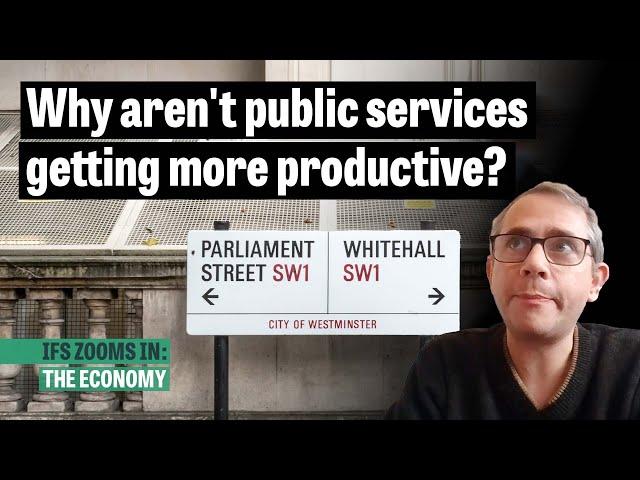
Has government become less efficient? | IFS Zooms In
Комментарии:

Posted this last time but posting again because I'd love an answer! Please could you do an episode discussing Land Value Tax? Every time I hear an economist talk about it they seem to go all moon eyed, wax lyrical about how amazing that would be and what a shame it will never happen, and then move on to something else. Is it really that great and, if so, why haven’t we got one?
Ответить
Great stuff as ever. Anyone ever wonder if we've got more people analyzing, commenting and criticizing our institutions than we have people actually working in them to make them better?
Ответить
Yes, privatise them. Somehow.
Ответить
Ive Been in business and as a management consultant for 20+ yrs...
The reason the public sector is so bad is the measures are all wrong....
They fudge the numbers for political gains because the measures are so poor.
The same principle as in business,ore money increases Inefficiency because there's no need to improve.... The money masks the poor working practices, it's only when businesses are starved of money and profits do they have to improve what they do to become more capable. The endless money in public sector makes them Inefficient and Ineffective as theres no need to improve

Rachel Reves says she’s going to ask private sector about how to bring productivity. Well it’s simple don’t give massive pay rises for absolutely nothing.
This government just caved in to various unions with nothing in return. That should make the pay rises for the government zero this year.

Because they don't have any competition, and cannot fail. Next question.
Ответить
In my past experience in the public sector (policy) there are various things that could help.
1) Stop cutting out admin and HR staff as this work is just done at a higher pay rate by senior grades.
2) Multi year spending reviews and give the ability to move money between years.
3) Reform procurement regulations and practices that take far too long
4) Identify and solve pinch points in capacity within systems
5) More rigorous assessment of what works with mandatory publication, independent of Ministers and policy officials.
6) more prompt decisions on Departmental budget allocations
7) How to motivate people when you have no carrot and no stick either (can be done but it’s tricky if people don’t participate)

I suspect that the elephant is the room for the NHS is "free at the point of use". I know this is not directly relevant to efficiency, but it is relevant to costs and sustainability of the system. I think that this may be a taboo subject, akin to blasphemy (or perhaps I'm too ignorant to know that it actually does get discussed).
Ответить
I've worked in several governement departments and the level of waste in the DWP and HMRC in particular is amazing, I saw someone promoted so someone else didnt have to managed him, he wouldn't take a sideways step so the manager got him promoted. Imagine this on a grand scalews and you have clueless idiots at high levels of management in the end
Ответить
How many Russians/Israelis have they killed?
Ответить
I really think the public sector should be given gdp performance-based bonuses
Ответить
After 40 years in the NHS, I would challenge the narrative of diminishing productivity in the NHS, although I have spent the last 25 years working to improve processes and there is a huge opportunity for further improvement.
When I was a young doctor, there was far less that we could do for people during their last year or two of life, typically in their late 60s or early to mid 70s, and patients were typically in hospital 2 or three times during that period. 4 decades later, the picture is radically different. We are much better at turning illness around, and people are now living 10 or more years longer. The consequences, however, include that individual patients have significantly more admissions to hospital during their last decade. The quality of life, moreover, improved overall. The alleged stagnation in the 2000s completely ignores the increasing complexity of medical care during that decade as medical care finally became effective.
Evidence of that productivity is seen clearly in life expectancy figures, although that was never discussed in performance management conversations.
I strongly agree with the observation that NHS management is poorly resourced and poorly rewarded, particularly at the lower tiers of management. Managers are, moreover, poorly trained and senior managers seem to have little understanding of the science of health care management, in spite of the wealth of literature on the subject.
Finally, it is extremely difficult to re-engineer systems and processes (to improve productivity) within existing budgets, particularly when those budgets are subject to brutal cost improvement programs that are destined to meet cost increases rather than being reinvested to support system improvements.
Like you, I have had numerous conversations with private sector managers and educated individuals from the chattering classes who have strong opinions about how to improve the NHS. Most of them haven’t a clue.
Best wishes. D.

Here's a short NHS story: Last week I developed a fingertip infection. I've had them in the past, so I knew that it had reached the stage when I needed antibiotics and probably lancing. On Saturday morning I went to the chemist who examined the finger and agreed that I needed antibiotics. Had the system allowed, she would have sold me some there and then, at a small cost to me, and zero to the NHS, and my cure could have started immediately. Instead, I had to wait until Monday, fill out an online form, speak to the doctor by phone for 10 minutes, wait at the surgery for 50 minutes, have a 10 minute consultation, get an electronic prescription, wait for an hour for the e-message to reach the chemist, go to the chemist and wait a further 10 minutes for my antibiotics, which were free due to my age, even though I was ready and happy to pay. I performed the lancing myself at home with a sterilised needle, as the doctor had said she had never done one before! The country is doomed.
Ответить
Be careful what you wish for re: NHS productivity: it gets “better” when wait times are long and “worse” when wait times are short. Eg 2000s vs 2010s. Call centres, pubs work the same way. If you want to be able to walk into a pub and be served immediately, some of the time the staff will be idle. If you want staff to be 100% productive, at some times there will be a long wait. Bigger hospitals are better able to manage this trade off but if people want to hang on to smaller local hospitals / GPs then you can only have availability whenever you want it if productivity is relatively low. Strange but true, this can be proven mathematically. That said obviously if you have a fixed number of staff you have to be more productive to reduce queues, but at some point you hit the ‘queue at the bar’ vs ‘idle staff’ limitation.
Ответить
I work for a company that sells software that reduces cost and improves productivity. Selling to the public sector is like nailing a jelly to a tree. They are a decade behind the private sector, who can find extra budget for innovations that make sense within a year.
Ответить
I got 4mins in and decided this wasn’t worth the extra 39mins. Measure that how you will……
Ответить
I think you explained the problem very nicely. It was circa 40 minutes in before someone asked what we might actually do, and then the solution was . . . . . write a white paper !
Ответить
Activity or throughout indicators are important, but surely in health and education we need to improve our output measures. It isn’t easy but 40 years ago Professor Alan Williams developed some of the first quality adjusted life year (QUALY) indicators are they are used by NICE in evaluation new therapies and pharmaceuticals. Could these not be extended
Ответить
Who would expect falling relative wages and an underspend on capital investment would harm long run productivity.
I mean productivity is famously unrelated to the quality of human capital hired and or developed. And the fixed capital/means of production has never been at all tied to the outputs of said product.
It’s a complete mystery.

The real "insight" is near the end - As with all public spending - you can never reduce spending. You can only hope to increase output and allow the budget to slowly be reduced ,over periods of several governments, by inflation and reduced increases. There is never a magic bullet. The public will never accept that truth.
Ответить
People aren’t working as hard because they have been paid poorly and had poor pay rises for so long. Plus the good people have left to go and get more pay in the private sector. It’s quite simple.
Ответить
Here in wales the government has done a pilot scheme on public sector workers doing a 4 day week, they concluded the same amount of work was done, i think that highlights the problem with public sector work culture, for this to be sustainable there must a constant push for better productivity
Ответить
Is the IFS ever going to set out what they believe tax and spend should be?
Ответить
Sam Freedman: "In terms of extracurricular activity there has not been a drop off in art,sport and music. Schools do as much sport as they used to."
This is disingenuous. What time periods are you comparing in the UK? Sport has been decimated by the loss of playing fields. Music learning and singing in schools has also been decimated. Learning an instrument in school used to be very subsidised or free and now is not.

My family members who work for the NHS have serious health problems with their hearts and cognitive ability since getting covid infection. Never any mention of this when talking about productivity
Ответить
Having worked in both, I think this little chap Freedman is right to be skeptical about what exactly the private sector can offer the public sector that would increase its productivity. But I’d be equally skeptical about what the legion of ‘policy’ experts, commentators and armchair strategists offer too. There’s so much talk and advice around, and so little meaningful action it seems.
Ответить
You'd get a lot more for taxpayer's money if you focused on prevention in the NHS - the government have let the food and drink industry produce products that damage our health - make us obese and cause metabolic disorders and mechanical injury through obesity. If people ate less, less often and more healthily then you would have so many people on NHS waiting lists.
Ответить
I worked in a company that expected a 10% each improvent in productivity each year. It wasn't easy but was fun to work there. We went from 30 to 3 people delivering the same number of projects with better quality and much lower cost. Yes it did inolve redundancy or re-allocating elsewhere to a different group.
Ответить
Increasing productivity in the public sector is helped by sharing good practice, so well-managed areas can provide insights for the less well managed. Easy wins are staff suggestion schemes, the NHS trust I (briefly) worked for didn't have one, so I ended up asking a ward manager to raise my suggestion at the next management meeting.
Ответить
Governments have no incentive to ever scale back, it seems an impossibility, unlike a commercial business that has to react to circumstance ...... but then government can always pick our pockets for more money.
Ответить
Much of the NHS productivity problems are actually because of the disconnect between health and social care. Yet this doesnt even get a mention.
You simply cannot fix NHS productivity and ignore social care and indeed the carers that provide 98% of peoples care.
The failure in different parts of the system are harming the entire of public services.
e.g. Most people in prison and most of polices time are spent on mental health issues.

Government is getting more accountable, in theory that's a good thing and it has certainly done away with the old boys club attitude of the 70's and 80's. However that accountability has a cost and no resources were put into the system for it. As an example, this week I spent 22 hours dealing with FOI requests and another 6 hours dealing with returns to central government for grants we'd had to bid for (these grants have basically just replaced the money we used to get from the government as part of our settlements). The time spent dealing with that is time that hasn't been spent dealing with actual issues that impact people day to day. So of my 40 hour week only 12 hours of it has actually been spent being productive. Multiply that across various departments and across various council's and you lose thousands of hours. Accountability is a good thing, but you have to resource it. If you expect that work to be done from existing resources then all that happens is the actual work grinds to a halt.
Ответить
Public sector is pretty useless, no incentive, hardly any repercussions for poor workmanship and basically impossible to sack once 2 years in. Private sector better but not by much tbh in my experience. Still has it's problems but much more reactive.
Ответить
How does the increase of public sector pension payout impact the productivity calculation? These must be taking up more of our tax money, so should not be included in the calculation, or at least called out as an expense that will have no productivity associated with it.
Ответить
Enjoy your informational content .❤ Thanks from Taiwan .
Ответить
A big part of the Civil Service issues in my area relate to staffing.
Our recruitment processes rather than targeting the growing skills deficit that exists, it focuses on soft skills. The most commonly used Behaviors (interview question themes) used across the Civil Service are focused around 'Working Together', 'Communicating and Influencing' and 'Making Effective Decisions' rather then technical knowledge and skills. This has led to a culture of meetings about meetings rather than a culture of 'getting S done' (please forgive the use of those terms, its late at night)
This has led to a compounding situation where people with the technical skills / knowledge are over worked trying to improve or change our business, creating a market for contracting staff / services. Despite the exorbitant costs involved in hiring these people (at least 2X civil servant cost) , which isn't real tracked due to poor tasking and management by soft skill managers. Actual, long term capability released by hiring new technical staff is restricted due to budgetary concerns over staffing costs. But contracted services and contracting staff come from an unrestricted budget.
The Civil Service runs the day to day running of the country and enacts the will of HM Government. If you want more productivity from it, the ability to adapt and change quickly to meet HM Governments will, then that requires a solid skill based foundation to adapt our processes and IT. However, we exist in a world of mostly policy makers, soft skill based managers but very few do'ers.

First rate discussion. Thank you!
Ответить
Another stark reminder of what dire straits Britain is in and how the path of improvements is rapidly petering out as we edge our way towards national bankruptcy
Ответить

























